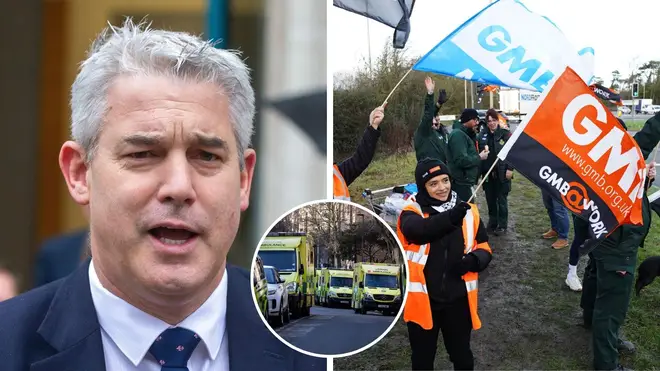
Simon Marks 4pm - 7pm
15 January 2023, 14:05

The "voluntary arrangements" put in place during recent ambulance strikes were not enough to "ensure patient and public safety", Health Secretary Steve Barclay has told union bosses.
Mr Barclay wrote to the GMB union setting out why minimum service levels needed to be set into law during "blue light" industrial action, which he said had the potential to "put lives at immediate risk".
It comes as anti-strike legislation is due to be debated on Monday by MPs.
The Cabinet minister said he had been asked to reply to the union on the Prime Minister's behalf after it published an open letter saying ambulance staff felt "demonised" by ministers.
The GMB asked the UK Government to "stop attacking us" after Rishi Sunak said it was "terrifying" that the public did not know if they would "get the treatment they need" during industrial action.
Ambulance staff from Unison and GMB - including paramedics and call handlers - took part in staggered strikes across a 24-hour period on Wednesday.
Read more: NHS must 'reform or die', Starmer warns as he backs overhaul of health service
Read more: Union warns twice the number of nurses could strike in February if no progress in negotiations

This GP argues that the NHS have been calling for safe staffing ratios since the Francis report
In his letter dated Sunday January 15, Mr Barclay said he accepted that a "certain amount of disruption is inherent to any strike".
But he argued that the anti-strike legislation was required to ensure a nationally agreed level of service cover was in place when ambulance workers join picket lines in future.
"During recent action I have not been reassured that the current system of voluntary arrangements can be relied upon to ensure patient and public safety," the Health Secretary said.
"While all unions involved in the recent strikes agreed to coverage of category 1 calls, not all agreed derogations for coverage of all category 2 calls, which includes serious conditions such as a stroke or chest pain.
"Given that these calls are urgent, this is material to the risk to life of the strike action."
He said assurances from trade unions about the level of cover across ambulance services had been "volatile" in the run-up to strikes, with negotiations "still taking place" late into the evening before a strike day.

Ambulance workers strike across the country as part of GMB union industrial action
Defending the controversial strike bill, Mr Barclay said it would provide the public with "much needed assurance that a certain level of urgent and time critical care will always continue throughout strike action".
Ambulance workers and firefighters were being included in the legislation because "disruption to blue light services puts lives at immediate risk".
The Health Secretary said use of the proposed legislation would only be a "last resort", insisting that it would not hinder employees' right to strike.
It will instead "reflect that some individuals will not be able to strike at certain times so that a minimum service level can be maintained", he said.
The GMB said its ambulance committee would discuss the letter at Monday's meeting and consider its response.
Ambulance staff are scheduled to walk out again on January 23.